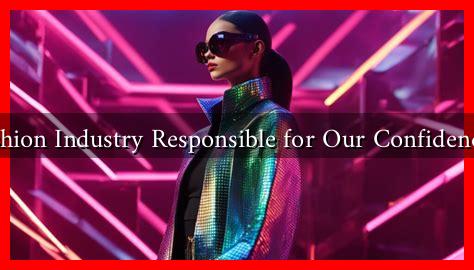-
Table of Contents
Is the Fashion Industry Responsible for Our Confidence Levels?
The fashion industry is a powerful force that shapes not only trends and styles but also societal norms and individual self-perception. As we navigate through a world increasingly influenced by visual culture, the question arises: is the fashion industry responsible for our confidence levels? This article delves into the intricate relationship between fashion, self-esteem, and societal expectations, exploring how clothing choices can impact our confidence and overall well-being.
The Psychological Impact of Fashion
Fashion is more than just clothing; it is a form of self-expression and identity. The way we dress can significantly influence how we feel about ourselves. Research indicates that clothing can affect our mood, behavior, and even our cognitive processes. This phenomenon is often referred to as “enclothed cognition,” which suggests that the clothes we wear can impact our psychological state.
- Self-Expression: Fashion allows individuals to express their personality, creativity, and individuality. Wearing clothes that resonate with one’s identity can boost self-esteem.
- Social Perception: Society often judges individuals based on their appearance. Fashion can enhance or diminish how we are perceived by others, affecting our confidence levels.
- Body Image: The fashion industry often promotes specific body types as ideal, which can lead to body dissatisfaction among those who do not fit these standards.
The Role of Media and Advertising
Media and advertising play a crucial role in shaping our perceptions of beauty and success. The fashion industry often uses idealized images of models and celebrities to sell products, creating unrealistic standards that many strive to achieve. This can lead to a cycle of comparison and self-doubt.
- Unrealistic Standards: Advertisements frequently feature digitally altered images, which can distort reality and set unattainable beauty standards.
- Influencer Culture: Social media influencers often showcase curated lifestyles and appearances, further perpetuating the idea that confidence is tied to physical appearance.
- Consumerism: The pressure to keep up with fashion trends can lead to compulsive buying behaviors, which may provide temporary boosts in confidence but can ultimately lead to financial stress and anxiety.
Case Studies and Statistics
Several studies have explored the connection between fashion and confidence. For instance, a study published in the journal “Psychology of Fashion” found that individuals who dressed in a way that aligned with their self-image reported higher levels of self-esteem. Additionally, a survey conducted by the American Psychological Association revealed that 70% of women felt more confident when they wore clothes that made them feel good about their bodies.
Moreover, the impact of fashion on confidence is not limited to women. A study by the University of Kent found that men also experience boosts in self-esteem when they wear clothing that they perceive as stylish or fashionable.
Fashion as a Tool for Empowerment
While the fashion industry can contribute to negative self-perception, it also has the potential to empower individuals. Many brands are now embracing body positivity and inclusivity, promoting diverse representations of beauty. This shift can help individuals feel more accepted and confident in their own skin.
- Body Positivity Campaigns: Brands like Aerie and Savage X Fenty have gained popularity for their inclusive marketing strategies, showcasing models of various sizes and backgrounds.
- Sustainable Fashion: The rise of sustainable fashion has encouraged consumers to make mindful choices, fostering a sense of pride and confidence in their purchasing decisions.
- Community Building: Fashion can create communities where individuals support one another, enhancing self-esteem through shared experiences and encouragement.
Conclusion
In conclusion, the fashion industry plays a significant role in shaping our confidence levels. While it can perpetuate unrealistic standards and contribute to body dissatisfaction, it also has the power to empower individuals through self-expression and inclusivity. As consumers, we have the ability to choose how we engage with fashion, opting for brands and styles that promote positive self-image and confidence. By fostering a culture of acceptance and diversity, the fashion industry can help individuals feel more confident in their own skin, ultimately leading to a healthier relationship with self-esteem.
For further reading on the psychological effects of fashion, you can explore resources from the American Psychological Association.

